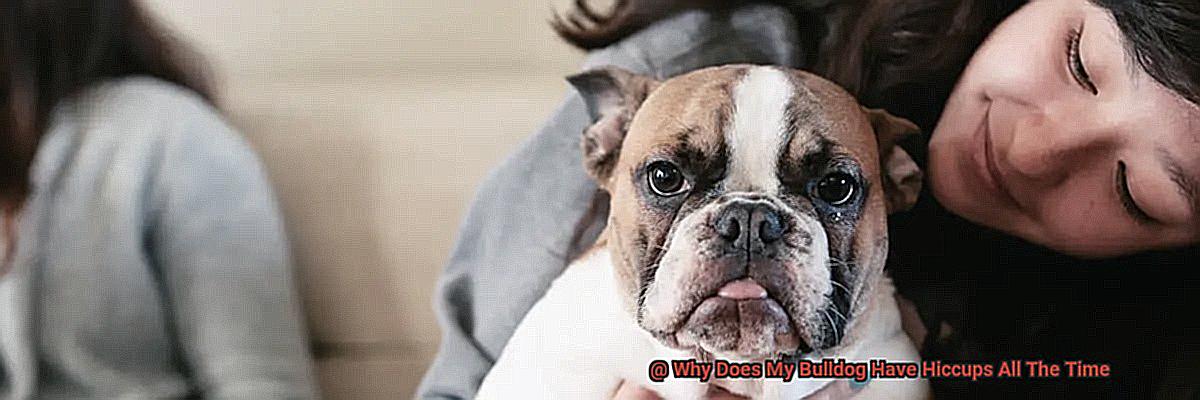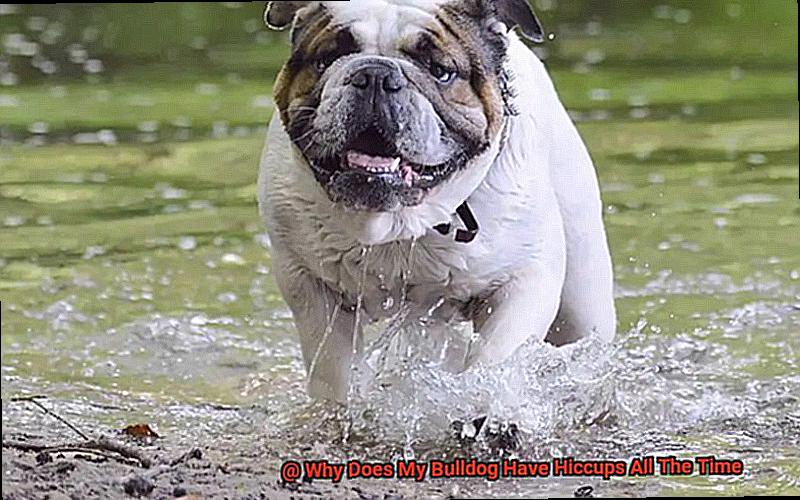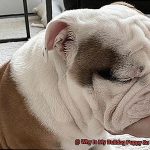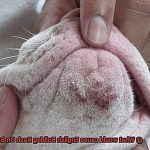Why Does My Bulldog Have Hiccups All The Time?
Are you concerned about your bulldog’s hiccups? Don’t worry; hiccups in bulldogs are usually nothing to be alarmed about. But why does your pup get them all the time?
In this article, we’ll look at some of the possible causes of your bulldog’s hiccups and offer some advice on how to avoid them.
So if you’re curious about why your four-legged friend is always hiccuping, read on and find out.
What are Hiccups?
Contents
- 1 What are Hiccups?
- 2 Why Do English Bulldogs Have Hiccups?
- 3 Is it Normal for English Bulldogs to Have Hiccups?
- 4 Should I be Concerned if My Bulldog Gets Hiccups a Lot?
- 5 How to Get Rid of Your Bulldog’s Hiccups
- 6 Differentiating Between Hiccups and Other Respiratory Issues in Bulldogs
- 7 When to Seek Veterinary Care for Your Bulldog’s Hiccups
- 8 Tips to Prevent Your Bulldog from Getting Hiccups
- 9 Conclusion
Hiccups are a familiar experience for both humans and animals alike.
An involuntary contraction of the diaphragm, the muscle between your chest and abdomen, causes a sudden intake of air, resulting in the classic “hic” sound.
Hiccups can last for seconds, minutes, or even hours.

Common triggers include eating too quickly or drinking carbonated beverages.
In dogs, hiccups can be indicative of an underlying medical condition, so it’s important to pay attention to any changes in behavior and seek veterinary advice if necessary.
Why Do English Bulldogs Have Hiccups?
Hiccups in English Bulldogs can be caused by a variety of factors, such as eating too quickly, drinking too much water, anxiety, excitement, and even temperature changes.
In some cases, hiccups can also be attributed to an underlying health issue like an infection or inflammation in the digestive tract or gastroesophageal reflux disease (GERD).
It’s important to remember that not all hiccups are indicative of a medical condition. In fact, hiccups in English Bulldogs can simply be a sign of normal digestion or excitement.
However, if your dog has frequent and persistent hiccups, it’s best to get them checked out by the vet to ensure there are no underlying health issues causing them.
So if you have an English Bulldog and they seem to be getting the hiccups all the time, don’t worry. It could be due to a variety of factors, such as eating too quickly or drinking too much water.
However, if your dog has frequent and persistent hiccups, you should take them to the vet for a check-up to rule out any underlying medical conditions.
Is it Normal for English Bulldogs to Have Hiccups?
The answer is a resounding yes! Hiccups are common in this breed and usually aren’t a cause for concern. Eating or drinking too quickly, excitement, or an irritation of the diaphragm can all trigger hiccups in English Bulldogs.
However, if your bulldog’s hiccups persist for more than 24 hours, it could be an indication of a more serious underlying condition such as acid reflux, gastroesophageal reflux disease (GERD), esophageal spasms, infection, or even a tumor. In these cases, it’s important to contact your veterinarian and have them investigate further.
Overall, while hiccups are normal in English Bulldogs, it’s still important to pay attention to any changes in their behavior that could indicate a more serious disorder.
Should I be Concerned if My Bulldog Gets Hiccups a Lot?
The good news is that in most cases, hiccups are normal and harmless. However, if your bulldog’s hiccups become more frequent or severe, it could indicate an underlying medical condition and should be addressed with your veterinarian.
Common causes of frequent hiccups in bulldogs include stress, hunger, eating too quickly or eating too much, gastroesophageal reflux disease (GERD), esophagitis, tracheal collapse, and other respiratory issues. If you notice that your bulldog’s hiccups are becoming more frequent or severe, it’s important to take them to the vet for an examination.
Your veterinarian can help you determine the cause of the hiccups and provide treatment options depending on the underlying condition. In some cases, the hiccups may resolve on their own without any treatment; however, if they persist or worsen over time, it is important to seek veterinary care as soon as possible.
So if your beloved bulldog is having frequent hiccups, don’t hesitate to consult your veterinarian for assistance.
How to Get Rid of Your Bulldog’s Hiccups
Hiccups in bulldogs are usually harmless and will go away on their own, but if they persist, it could indicate an underlying medical condition. Luckily, there are a few things you can do to try and get rid of your bulldog’s hiccups quickly and painlessly.
Distraction is Key
Distraction is the best way to get rid of your bulldog’s hiccups. To grab their interest, try clapping your hands or shaking a toy in front of them. You can also try making loud noises or sudden movements that will break the hiccup cycle.
The “Belly Rub” Method
The “belly rub” method is another option you may try. This requires gently rubbing your bulldog’s belly in a circular motion, as this helps to relax their diaphragm, which is responsible for hiccups.
Cold Drinks
Giving your bulldog something cold to drink, such as ice water or ice cubes, can also help them to reactivate their diaphragm muscles that cause hiccups. This helps to reset the diaphragm, which can help stop the hiccup cycle.
Change the temperature
Changing the temperature in the room can also help, as sudden temperature shifts can alter the hiccup cycle. As this helps to restore their diaphragm, you may also try giving your bulldog a teaspoon of sugar. If none of these methods work, see your doctor to rule out any underlying medical conditions that might be causing the hiccups.
Hiccups are usually harmless and should not be cause for concern, but if you’re looking for medical assistance, seek medical attention from your veterinarian right away.
Differentiating Between Hiccups and Other Respiratory Issues in Bulldogs
Hiccups are a common occurrence in Bulldogs, but it’s essential to know how to distinguish them from other respiratory issues. Usually, hiccups are caused by diaphragm irritation, which can be the result of eating too quickly or drinking carbonated beverages. Stress and anxiety can also bring on hiccups in Bulldogs.
However, if your Bulldog is exhibiting additional symptoms such as coughing, wheezing, difficulty breathing, or labored breathing, they may have a respiratory issue that requires veterinary attention. It’s important to take these signs seriously because they could indicate a more serious health condition.
If your Bulldog has only had the occasional hiccup, there is no need to worry.
To help reduce their anxiety levels and prevent hiccups from occurring in the future, make sure they are not eating or drinking too much and that they are not overeating or overconsuming.
When to Seek Veterinary Care for Your Bulldog’s Hiccups
Hiccups in bulldogs can sometimes be a sign of an underlying condition, so it’s important to pay attention to them. If your bulldog’s hiccups persist and don’t go away with home remedies, it’s essential to seek veterinary care.
Additionally, if your bulldog has hiccups accompanied by other symptoms such as vomiting, loss of appetite, lethargy, or difficulty breathing, it’s critical to get your pooch checked out right away.
When you bring your bulldog to the vet, they’ll likely perform a physical examination and may order additional tests such as x-rays or blood tests to diagnose the cause of the hiccups. Treatment for hiccups will depend on the underlying cause. So, it’s important to get an accurate diagnosis from your veterinarian.
If your bulldog is exhibiting persistent hiccups or other signs of illness, don’t hesitate to see your vet. They’ll help you determine the best course of action for treating your pup’s hiccup issue.
Tips to Prevent Your Bulldog from Getting Hiccups
Are you worried about your bulldog getting the hiccups? English Bulldogs are prone to hiccups, but there are some steps you can take to help prevent them. Here are some tips on how to stop your bulldog from getting hiccups:
Exercise
Make sure your bulldog gets enough exercise, as a lack of physical activity can lead to hiccups.
Eating Habits
Avoid feeding your bulldog large meals or treats in one sitting, as this can cause them to get hiccups. Instead, try to feed them smaller meals throughout the day.
Drinking Habit
Too much water or other liquids can also cause hiccups in dogs, so make sure they aren’t drinking too much at once.
Stress Levels
Stress is a major factor in dog hiccups, so try to keep their environment as calm and stress-free as possible.
Loud Noises
Loud noises can startle your bulldog and cause them to get the hiccups, so avoid any loud noises if possible.
Underlying Health Issues
If your bulldog’s hiccups don’t seem to be going away after trying all of the above tips, it may be worth visiting the vet to check for any underlying health issues that could be causing the problem.
Also Read: Why Do English Bulldogs Have Different Faces?
Conclusion
Hiccups in English Bulldogs are usually nothing to be worried about. But if your pup’s hiccups become frequent, it’s important to get them checked out by a veterinarian. Prompt medical care and diagnosis of the underlying cause can ensure your Bulldog stays healthy and happy.
To prevent hiccups, make sure your Bulldog gets plenty of exercise, feed them smaller meals throughout the day, avoid giving them too much water or other liquids at once, and visit the dentist if their hiccups persist or worsen over time.




